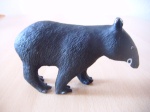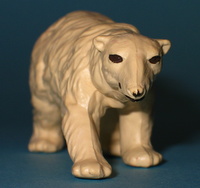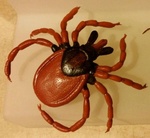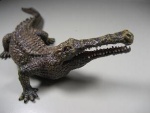| | Mathison Museum of Natural History |  |
|
+12landrover Kikimalou bmathison1972 Taos widukind Jill Duck-Anch-Amun lucky luke Caracal rogerpgvg Roger Bloodrayne 16 posters |
|
| Author | Message |
|---|
widukind

Country/State : Germany
Age : 48
Joined : 2010-12-30
Posts : 45745
 |  Subject: Re: Mathison Museum of Natural History Subject: Re: Mathison Museum of Natural History  Sun Nov 10, 2024 4:11 pm Sun Nov 10, 2024 4:11 pm | |
| |
|
  | |
rogerpgvg

Country/State : UK
Age : 54
Joined : 2016-04-29
Posts : 3894
 |  Subject: Re: Mathison Museum of Natural History Subject: Re: Mathison Museum of Natural History  Sun Nov 10, 2024 6:04 pm Sun Nov 10, 2024 6:04 pm | |
| Beautiful figure. The front leg is moulded separately from the rest of the body, in Japanese Gashapon style. Is this common for Science & Nature models? |
|
  | |
bmathison1972

Country/State : Salt Lake City, UT
Age : 52
Joined : 2010-04-13
Posts : 6710
 |  Subject: Re: Mathison Museum of Natural History Subject: Re: Mathison Museum of Natural History  Mon Nov 11, 2024 1:54 pm Mon Nov 11, 2024 1:54 pm | |
| Species: Evenus coronata (Hewitson, 1865) Common name(s): crowned hairstreak; Hewitson's blue hairstreak About the Figure: Manufacturer: Toy Major Series: Butterflies Year of Production: 1996 Size/Scale: Wingspan approx. 6.5 cm for a scale of 1.4:1-1.1:1 (slightly larger than 1:1 for a very large specimen) Frequency of species in toy/figure form (at time of posting): Rare Miscellaneous Notes: This is the second time we've seen E. coronata in the Museum. The Toy Major butterflies are somewhat of an enigma. There are 12 sculpts, labeled A-L on the underside as well as the copyright year of 1996. Each sculpt has been painted multiple times, resulting in anywhere from 24-36 figures (maybe more?). Also, the different repaints may have been released over multiple years while retaining the 1996 mark. They were sold in sets of various numbers. They are not marketed at the species level, but most are painted to look like recognizable species. My identification here today is based on the similarities to the Club Earth figure which was specifically marketed as E. coronata. Several species produced by Toy Major have been produced by other companies of the same era (Club Earth, early Safari Ltd., etc.), as these companies tend to influence one another, and it is sometimes difficult to determine who came first. About the Animal: Geographic distribution: Coastal Central and South America, from southern Mexico to Ecuador Habitat: Montane cloud forests Diet: Larvae feed on plants in the family Sapotaceae; adults feed on nectar IUCN Status (at time of posting): Not Evaluated Miscellaneous Notes: While the dorsal surface of the wings of E. coronata are a brilliant, metallic blue, the undersides are predominately olive-green. This allows the butterfly camouflage when it sits at rest with its wings folded over its body, blending in with the leaves of its rainforest home. [You must be registered and logged in to see this image.] |
|
  | |
widukind

Country/State : Germany
Age : 48
Joined : 2010-12-30
Posts : 45745
 |  Subject: Re: Mathison Museum of Natural History Subject: Re: Mathison Museum of Natural History  Mon Nov 11, 2024 6:30 pm Mon Nov 11, 2024 6:30 pm | |
| |
|
  | |
Roger
Admin

Country/State : Portugal
Age : 50
Joined : 2010-08-20
Posts : 35835
 |  Subject: Re: Mathison Museum of Natural History Subject: Re: Mathison Museum of Natural History  Mon Nov 11, 2024 9:58 pm Mon Nov 11, 2024 9:58 pm | |
| - bmathison1972 wrote:
- Roger wrote:
- Beautiful picture! This one belongs to a trio of tapirs released in 2010. It's not that common that three main players of this hobby release a not so common animal in the exact same year. It happened again in 2012 with the less common giant sable and Safari Ltd is the only player wich contributed for both trios.
Curiously I have myself the Safari and the Schleich models instead. Unfortunately the painting of my Schleich model is peeling.
You probably can't go wrong with any of the three. If I had a choice I might favor Safari, but this Papo one is very nice and I am thankful for your kind gift! 
I certainly don't ever seeing myself replacing it! You're welcome, Blaine!  My favorite is also the Safari model if I do not count my Lineol but they belong to different leagues. Though, the quality level of the 2010 trio is very close, I agree we can't go wrong with any of them. |
|
  | |
bmathison1972

Country/State : Salt Lake City, UT
Age : 52
Joined : 2010-04-13
Posts : 6710
 |  Subject: Re: Mathison Museum of Natural History Subject: Re: Mathison Museum of Natural History  Tue Nov 12, 2024 12:36 pm Tue Nov 12, 2024 12:36 pm | |
| Species: Apis mellifera Linnaeus, 1758 Common name(s): western honey bee; European honey bee About the Figure: Manufacturer: Safari Ltd. Series: Incredible Creatures Year of Production: 2006 Size/Scale: Body length (excl. appendages) approx. 11.0 cm for a scale of 9.2:1-7.3:1 for a worker bee Frequency of species in toy/figure form (at time of posting): Common Miscellaneous Notes: This is the seventh time we've seen A. mellifera in the Museum. With nearly 1 million described species of insects, it's hard to believe this is the only insect ever made originally for the Incredible Creatures line (not including the last remaining Hidden Kingdom figures that were integrated into the IC line in 2018 or adult insects from some of the life cycle sets that were briefly sold in the IC line). About the Animal: Geographic distribution: Nearly worldwide. Believed to be native to Africa and/or Central Asia, with natural spread throughout Africa and Europe; introduced to the Western Hemisphere, Australia, New Zealand, and East Asia for honey production. Habitat: Highly varied; anywhere with suitable hive-building sites and flowers for food source. Diet: Larvae are fed pollen by the adults; adults eat nectar and pollen IUCN Status (at time of posting): Data Deficient Miscellaneous Notes: Apis mellifera ranks as the single most important insect of pollinator for crops globally, and is the most effective crop visitor worldwide, contributing approximately 13% of floral visits to 5% of plant species across all plant networks. In the USA alone, it was estimated that honey bees contribute $11-$18 billion USD annually to agriculture via pollination. [You must be registered and logged in to see this image.] |
|
  | |
widukind

Country/State : Germany
Age : 48
Joined : 2010-12-30
Posts : 45745
 |  Subject: Re: Mathison Museum of Natural History Subject: Re: Mathison Museum of Natural History  Tue Nov 12, 2024 2:50 pm Tue Nov 12, 2024 2:50 pm | |
| |
|
  | |
bmathison1972

Country/State : Salt Lake City, UT
Age : 52
Joined : 2010-04-13
Posts : 6710
 |  Subject: Re: Mathison Museum of Natural History Subject: Re: Mathison Museum of Natural History  Wed Nov 13, 2024 12:47 pm Wed Nov 13, 2024 12:47 pm | |
| Species: † Chasmosaurus belli (Lambe, 1902) About the Figure: Manufacturer: Haolonggood Series: 1:35 Science and Art Model Year of Production: 2024 Size/Scale: Body length approx. 12.5 cm for a scale of 1:38 Frequency of species in toy/figure form (at time of posting): Uncommon Miscellaneous Notes: Like other Haolonggood dinosaur figures, this Chasmosaurus comes in two colors; this one was marketed as 'green' and the other as 'red'. About the Animal: Geographic distribution: Late Cretaceous (Campanian) of present-day western North America (Laramidia) Habitat: Open woodlands and surrounding fern groves Diet: Plants IUCN Status (at time of posting): N/A [prehistoric] Miscellaneous Notes: Chasmosaurus belli was originally described in the genus Monoclonius. Monoclonius is often now regarded as a dubius genus, with fossils originally described therein now assigned to other genera, including Chasmosaurus, Styracosaurus, Eoceratops, and Centrosaurus. To date, M. crassus is the only species that remains in the genus, although its validity remains in question. [You must be registered and logged in to see this image.] |
|
  | |
widukind

Country/State : Germany
Age : 48
Joined : 2010-12-30
Posts : 45745
 |  Subject: Re: Mathison Museum of Natural History Subject: Re: Mathison Museum of Natural History  Wed Nov 13, 2024 7:44 pm Wed Nov 13, 2024 7:44 pm | |
| |
|
  | |
bmathison1972

Country/State : Salt Lake City, UT
Age : 52
Joined : 2010-04-13
Posts : 6710
 |  Subject: Re: Mathison Museum of Natural History Subject: Re: Mathison Museum of Natural History  Thu Nov 14, 2024 12:38 pm Thu Nov 14, 2024 12:38 pm | |
| Species: Xantusia arizonae Klauber, 1931 Common name(s): Arizona night lizard About the Figure: Manufacturer: Wing Mau Series: Lizards Year of Production: unknown Size/Scale: Total figure length as displayed 12.5 cm. Snout-to-vent length approx. 5.7 cm, within scale 1:1 Frequency of species in toy/figure form (at time of posting): Unique (as a sculpt, see below) Miscellaneous Notes: There are two color versions of this sculpt. Both are marked 'Arizona night lizard' but today's is painted like typical X. arizonae while the other, which was seen in the Museum in August 2021 is painted like Bezy's night lizard ( X. bezyi), a species that was undescribed at the time these figures were produced (see below). The sculpt was also used for Club Earth's Lizards to Go collection. About the Animal: Geographic distribution: West-central Arizona, USA Habitat: Upland Sonoran Desert and Interior Chaparral; usually among granite rock outcrops, packrat nests, and dead yucca Diet: Small insects and arachnids IUCN Status (at time of posting): Least Concern Miscellaneous Notes: Prior to 2001, described species of Xantusia from Arizona included the desert night lizard ( X. vigilis) and the Arizona night lizard ( X. arizonae), the latter of which is sometimes considered a subspecies of the former. In 2001, X. bezyi was described from central Arizona based on molecular, morphologic, and ecological data. Among the morphologic features that helps distinguish X. bezyi are the larger maculae on a frequently orangish background. Typical X. arizonae and X. vigilis have smaller maculae that are arranged in somewhat irregular and disorganized rows, as seen in today's figure. [You must be registered and logged in to see this image.] |
|
  | |
widukind

Country/State : Germany
Age : 48
Joined : 2010-12-30
Posts : 45745
 |  Subject: Re: Mathison Museum of Natural History Subject: Re: Mathison Museum of Natural History  Thu Nov 14, 2024 6:29 pm Thu Nov 14, 2024 6:29 pm | |
| |
|
  | |
bmathison1972

Country/State : Salt Lake City, UT
Age : 52
Joined : 2010-04-13
Posts : 6710
 |  Subject: Re: Mathison Museum of Natural History Subject: Re: Mathison Museum of Natural History  Fri Nov 15, 2024 12:46 pm Fri Nov 15, 2024 12:46 pm | |
| Species: Oncorhynchus masou masou (Brevoort, 1856) Common name(s): cherry salmon; cherry trout; masu salmon About the Figure: Manufacturer: Yujin Series: Freshwater Fish Pictorial Book 1 Year of Production: unknown Size/Scale: Body length approx. 6.0 cm for a scale of 1:6-1:13.2 Frequency of species in toy/figure form (at time of posting): Rare Miscellaneous Notes: The fish is removable from its base. Yujin produced at least two other versions of this sculpt; I believe mine is from the original release. They also produced a special chase figure that was a different sculpt and represented the full breeding phase of the fish. Colorata also produced the masu and Kaiyodo produced a different subspecies ( O. m. macrostomus) for the Birdtales line. About the Animal: Geographic distribution: Northwest Pacific, from the Russian Far East to Taiwan; introductions to other parts of the world deemed unsuccessful Habitat: Anadromous. Young fish under three years live in freshwater rivers; adults are marine, benthopelagic, at depths of 0-200 meters. Diet: Crustaceans, small fish IUCN Status (at time of posting): Least Concern Miscellaneous Notes: Eating undercooked marine fish is a risk for anisakiasis, a zoonotic nematode infection caused by members of the genera Anisakis, Pseudoterranova, and Contracaecum. The disease is commonly seem in communities that regularly eat raw or undercooked marine and brackish water fish. Sampling of several fish, including O. masou masou, in the East Sea, South Sea, and Yellow Sea around the Korean Peninsula have shown relatively high infection rates with anisakids, especially Type 1 Anisakis species, which includes the A. simplex-complex. [You must be registered and logged in to see this image.] |
|
  | |
widukind

Country/State : Germany
Age : 48
Joined : 2010-12-30
Posts : 45745
 |  Subject: Re: Mathison Museum of Natural History Subject: Re: Mathison Museum of Natural History  Fri Nov 15, 2024 12:52 pm Fri Nov 15, 2024 12:52 pm | |
| |
|
  | |
bmathison1972

Country/State : Salt Lake City, UT
Age : 52
Joined : 2010-04-13
Posts : 6710
 |  Subject: Re: Mathison Museum of Natural History Subject: Re: Mathison Museum of Natural History  Sat Nov 16, 2024 1:46 pm Sat Nov 16, 2024 1:46 pm | |
| Species: Delias fasciata Rothschild, 1894 About the Figure: Manufacturer: Ikimon Series: Science Techni Colour - Private Specimen of a Lepidopterist Acrylic Mascot 3 Year of Production: 2022 Size/Scale: Wingspan approx. 4.8 cm for a scale of 1:1.3 Frequency of species in toy/figure form (at time of posting): Unique Miscellaneous Notes: The figures in this series are essentially photographs of butterflies and moths embedded in acrylic. Flip the figure over and the underside reveals an image of the ventral side of the animal, too. They are also sold as keychains (hence the hole in the acrylic above the head). About the Animal: Geographic distribution: Indonesia (Sumba) Habitat: Tropical deciduous rainforest Diet: Larval host plants unknown; adults take nectar from flowers IUCN Status (at time of posting): Not Evaluated Miscellaneous Notes: Delias fasciata is endemic to the Indonesian island Sumba. I couldn't find any information on the biology of this species and its host plant is unknown (or at least has not been published). [You must be registered and logged in to see this image.] |
|
  | |
widukind

Country/State : Germany
Age : 48
Joined : 2010-12-30
Posts : 45745
 |  Subject: Re: Mathison Museum of Natural History Subject: Re: Mathison Museum of Natural History  Sat Nov 16, 2024 10:38 pm Sat Nov 16, 2024 10:38 pm | |
| |
|
  | |
Duck-Anch-Amun
Country/State : Luxembourg
Age : 35
Joined : 2010-12-29
Posts : 1078
 |  Subject: Re: Mathison Museum of Natural History Subject: Re: Mathison Museum of Natural History  Yesterday at 12:56 pm Yesterday at 12:56 pm | |
| Interesting informations about the Night lizard - I have to change my species ID:) Didn´t know that, maybe someone could change the informations on TAW, too. |
|
  | |
bmathison1972

Country/State : Salt Lake City, UT
Age : 52
Joined : 2010-04-13
Posts : 6710
 |  Subject: Re: Mathison Museum of Natural History Subject: Re: Mathison Museum of Natural History  Yesterday at 1:56 pm Yesterday at 1:56 pm | |
| Species: Mycalesis gotama fulgina Fruhstorfer, 1911 Common name(s): Chinese brushbrown About the Figure: Manufacturer: Kaiyodo Series: Capsule Q Museum - Caterpillars Vol. 4 Year of Production: 2020 Size/Scale: Body length approx. 6.8 cm for a scale of 2:1 Frequency of species in toy/figure form (at time of posting): Unique Miscellaneous Notes: This figure was specifically marketed as the subspecies M. g. fulgina, which is endemic to Japan. The information below is based on the species as a whole, since it was more challenging to find biological information for individual subspecies. About the Animal: Geographic distribution: East and Southeast Asia, Japan Habitat: Tropical and subtropical broadleaf forest margins, grasslands, agricultural fields, riparian areas Diet: Larvae feed on several species of grasses, including members of the genera Miscanthus (silvergrass), Setaria (pitpit), Isachne (bloodgrasses), Oryza (rice), Bambusa (clumping bamboos); adults primarily feed on nectar from flowers, but also aphid honeydew, overripe fruit, and nutrients derived from damp soil and mudpuddles. IUCN Status (at time of posting): Not Evaluated Miscellaneous Notes: There are four subspecies of M. gotama. Mycalesis g. charaka occurs in India (Assam) to southern China and northern Vietnam. Mycalesis g. nanda is endemic to Taiwan while M. g. fulgina (today's figure) is endemic to Japan. I had trouble finding the full range of the type subspecies, M. g. gotama, but the type specimen is online at the Museum of Comparative Zoology's database, and the specimen's label says 'Central China'. [You must be registered and logged in to see this image.] |
|
  | |
widukind

Country/State : Germany
Age : 48
Joined : 2010-12-30
Posts : 45745
 |  Subject: Re: Mathison Museum of Natural History Subject: Re: Mathison Museum of Natural History  Yesterday at 7:00 pm Yesterday at 7:00 pm | |
| |
|
  | |
Sponsored content
 |  Subject: Re: Mathison Museum of Natural History Subject: Re: Mathison Museum of Natural History  | |
| |
|
  | |
| | Mathison Museum of Natural History |  |
|
